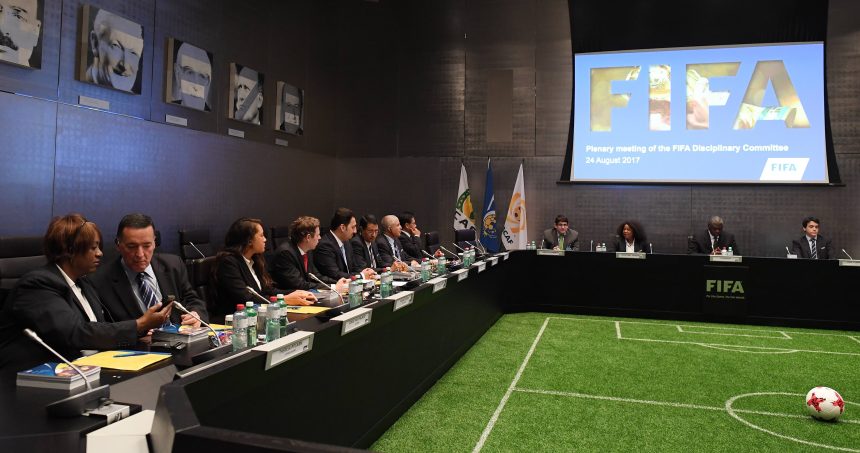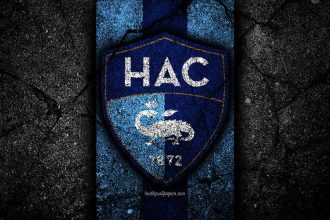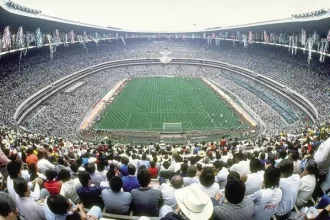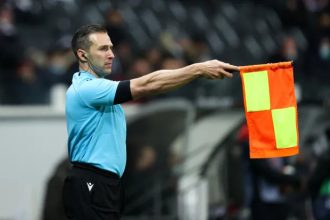CHAPTER 1. INFRINGEMENTS OF THE LAWS OF THE GAME
- 13. Offensive behavior and violations of the principles of fair play
- 14. Misconduct of players and officials
- 15. Discrimination
- 16. Unplayed matches and abandonment
- 17. Order and security at matches
- 18. Protests
- 19. Fielding an ineligible player
- 20. Manipulation of football matches and competitions
- 21. Failure to respect decisions
- 22. Forgery and falsification
- 23. Specific proceedings
- 24. Enforcement of sanctions
- 25. Determining the disciplinary measure
- 26. Recidivism
- 27. Suspension of implementation of disciplinary measures
- 28. Forfeit
- 29. Matches to be played without spectators
13. Offensive behavior and violations of the principles of fair play
1. Associations and clubs, as well as their players, officials, and any other member and/or person carrying out a function on their behalf, must respect the Laws of the Game, as well as the FIFA Statutes and FIFA’s regulations, directives, guidelines, circulars and decisions, and comply with the principles of fair play, loyalty, and integrity.
2. For example, anyone who acts in any of the following ways may be subject to disciplinary measures:
a) violating the basic rules of decent conduct;
b) insulting a natural or legal person in any way, especially by using offensive gestures, signs, or language;
c) using a sports event for demonstrations of a non-sporting nature;
d) behaving in a way that brings the sport of football and/or FIFA into disrepute;
e) actively altering the age of players shown on the identity cards they produce at competitions that are subject to age limits.
CHAPTER 2. DISORDERLINESS AT MATCHES AND COMPETITIONS
14. Misconduct of players and officials
1. Players and officials shall be suspended for misconduct as specified below and may be fined accordingly:
a) one match for players who are sent off for denying the opposing team a goal or an obvious goalscoring opportunity;
b) at least one match or an appropriate period of time for unsporting behavior towards an opponent or a person other than a match official;
c) at least one match for officials who are sent off for dissent by word or action;
d) at least one match for deliberately receiving a yellow or red card, including in order to be suspended for an upcoming match or to ultimately have a clean record;
e) at least two matches for serious foul play;
f) at least two matches for provoking spectators at a match by any means;
g) at least two matches or a specific period for acting with obvious intent to cause a match official to make an incorrect decision or supporting their error of judgment and thereby causing them to make an incorrect decision;
h) at least three matches for violent conduct;
i) at least three matches or an appropriate period of time for assault, including elbowing, punching, kicking, biting, spitting, or hitting an opponent or a person other than a match official;
j) at least four matches or an appropriate period of time for unsporting behavior towards a match official;
k) at least ten matches or an appropriate period of time for intimidating or threatening a match official;
l) at least 15 matches or an appropriate period of time for assaulting a match official, including elbowing, punching, kicking, biting, spitting, or hitting.
2. The misconduct described in paragraphs 1 b), f ), j), and k) is also subject to the respective sanctions in this Code, despite the fact that the offense has been committed off the field of play (including via social networks).
3. If the suspension is to be served in terms of matches, only those actually played by the respective team count towards the execution of the suspension. It is not necessary for a player to be included on the team sheet for the respective match or competition in order for a match suspension to be considered served.
4. A player or official who, in the context of a match (including pre-and post-match) or competition, publicly incites others to hatred or violence will be sanctioned with a ban on taking part in any football-related activity for no less than six months and with a minimum fine of CHF 5,000. In serious cases, in addition to the above sanctions and in particular, if the infringement is committed using social networks and/or the mass media (such as the press, radio, or television) or takes place on a matchday in or around a stadium, the minimum fine will be CHF 20,000.
5. If a national or club team conducts itself improperly (for example, if individual disciplinary sanctions are imposed by the referee on five or more players – three or more in the case of futsal – during a match), disciplinary measures may also be taken against the association or club concerned.
6. Additional disciplinary measures may also be imposed in all cases.
15. Discrimination
1. Any person who offends the dignity or integrity of a country, a person, or a group of people through contemptuous, discriminatory, or derogatory words or actions on account of race, skin color, ethnicity, nationality, social origin, gender, disability, sexual orientation, language, religion, political or any other opinion, wealth, birth or any other status or any other reason shall be sanctioned with a suspension lasting at least ten matches or a specific period, or any other appropriate disciplinary measure.
2. If one or more of an association’s or club’s supporters engage in the behavior described in paragraph 1, the association or club responsible will be subject to the following disciplinary measures:
a) For a first offense, playing a match with a limited number of spectators and a fine of at least CHF 20,000 shall be imposed on the association or club concerned;
b) For recidivists or if the circumstances of the case require it, disciplinary measures such as the implementation of a prevention plan, a fine, a points deduction, playing one or more matches without spectators, a ban on playing in a particular stadium, the forfeiting of a match, expulsion from a competition or relegation to a lower division may be imposed on the association or club concerned.
3. The competent judicial body may deviate from the above minimum sanctions if the association and/or club concerned commits to developing, in conjunction with FIFA, a comprehensive plan to ensure action against discrimination and to prevent repeated incidents. The plan shall be approved by FIFA and shall include, at least, the following three focus areas:
a) Educational activities (including a communication campaign aimed at supporters and the general public). The effectiveness of the campaign will be reviewed regularly.
b) Stadium security and dialogue measures (including a policy on how o enders will be identified and dealt with through football sanctions, a policy on escalation to state (criminal) legal authorities, and a dialogue with supporters and influencers on how to create change).
c) Partnerships (including working with supporters, NGOs, experts, and stakeholders to advise on and support the action plan and ensure effective and ongoing implementation).
4. Persons who are bound by this Code and have been the victim of potentially discriminatory behavior may be invited by the respective judicial body to make an oral or written victim impact statement and will have the right to request the motivated decision in proceedings before the judicial bodies, as well as to lodge an appeal and act as a party in the disciplinary appeal proceedings in accordance with the applicable provisions of this Code.
5. Unless there are exceptional circumstances if a match is abandoned by the referee because of racist and/or discriminatory conduct, the match shall be declared forfeited.
16. Unplayed matches and abandonment
1. If a match cannot take place or cannot be played in full for reasons other than force majeure, but due to the behavior of a team or behavior for which an association or a club is liable, the association or the club will be sanctioned with a minimum fine of CHF 10,000. The match will either be forfeited or replayed.
2. Additional disciplinary measures may be imposed on the association or club concerned.
3. If a match was abandoned and is to be replayed in full, any caution issued during that match shall be annulled. If a match was abandoned, in particular for reasons of force majeure, and it recommences at the minute at which play was interrupted, any caution imposed before the match was abandoned remains valid for the remainder of the match. If the match is not to be replayed, the cautions received by the teams shall be upheld.
17. Order and security at matches
1. Host clubs and associations are responsible for order and security both in and around the stadium before, during, and after matches. Without prejudice to their responsibility for the inappropriate behavior of their own supporters, they are liable for incidents of any kind, including but not limited to those listed in paragraph 2 below, and may be subject to disciplinary measures and directives unless they can prove that they have not been negligent in any way in the organization of the match. In particular, associations, clubs and licensed match agents who organize matches shall:
a) assess the degree of risk posed by the match and notify the FIFA bodies of those that are especially high-risk;
b) comply with and implement existing safety rules (FIFA regulations, national laws, international agreements) and take every safety precaution demanded by the circumstances in and around the stadium before, during, and after the match and if incidents occur;
c) ensure the safety of the match official and the players and official of the visiting team during their stay;
d) keep local authorities informed and collaborate with them actively and effectively;
e) ensure that law and order are maintained in and around the stadiums and that matches are organized properly.
2. All associations and clubs are liable for inappropriate behavior on the part of one or more of their supporters as stated below and may be subject to disciplinary measures and directives even if they can prove the absence of any negligence in relation to the organization of the match:
a) the invasion or attempted invasion of the field of play;
b) the throwing of objects;
c) the lighting of reworks or any other objects;
d) the use of laser pointers or similar electronic devices;
e) the use of gestures, words, objects, or any other means to transmit a message that is not appropriate for a sports event, particularly messages that are of a political, ideological, religious, or offensive nature;
f) acts of damage;
g) causing a disturbance during national anthems;
h) any other lack of order or discipline observed in or around the stadium.
18. Protests
1. Associations and their clubs are entitled to lodge protests. Protests must reach the Disciplinary Committee in writing via the FIFA Legal Portal, indicating the relevant grounds, within 24 hours of the end of the match in question.
2. The 24-hour time limit cannot be extended. For the sake of the smooth running of the competition, the corresponding competition regulations may shorten the protest deadline accordingly.
3. The protest fee is CHF 1,000. It must be paid when the protest is lodged and is reimbursed only if the protest is admitted in full.
4. A protest is admissible only if it is based on:
a) an ineligible player’s participation in a match as a consequence of that player not fulfilling the conditions de ned in the relevant FIFA regulations;
b) a unit field of play, as long as the referee was informed as soon as the problem was reported or observed (whether in writing before the match, or orally by a team captain, in the presence of the captain of the opposing team, during the match);
c) an obvious error by the referee as defined in Article 9 of this Code, in which case the protest may be directed only at the disciplinary consequences of the referee’s obvious error.
19. Fielding an ineligible player
1. If a player fielded in a match and/or competition is declared ineligible, the FIFA judicial bodies, taking into consideration the integrity of the competition concerned, may impose any appropriate disciplinary measures.
2. If a player fielded in a match is declared ineligible following a protest, the team to which the player belongs will be sanctioned by forfeiting the match and paying a minimum fine of CHF 6,000. The player may also be sanctioned.
3. The Disciplinary Committee may act ex offcio.
20. Manipulation of football matches and competitions
1. Anyone who directly or indirectly, by an act or an omission, unlawfully influences or manipulates the course, result, or any other aspect of a match and/or competition or conspires or attempts to do so by any means shall be sanctioned with a minimum five-year ban on taking part in any football-related activity as well as a fine of at least CHF 100,000. In serious cases, a longer ban period, including a potential lifetime ban on taking part in any football-related activity, shall be imposed.
2. If a player or official engages in the behavior described in paragraph 1, the club or association to which the player or official belongs may be sanctioned with the forfeiting of the match in question or may be declared ineligible to participate in a different competition, provided the integrity of the competition is protected. Additional disciplinary measures may be imposed.
3. Persons bound by this Code must cooperate fully with FIFA at all times in its efforts to combat such behavior and shall therefore immediately and voluntarily report to the secretariat of the Disciplinary Committee any approach in connection with activities and/or information directly or indirectly related to the possible manipulation of a football match or competition as described above. Any breach of this provision shall be sanctioned with a ban of at least two years on taking part in any football-related activity and a fine of at least CHF 15,000.
4. The Disciplinary Committee shall be competent to investigate and adjudicate all conduct on and off the field of play in connection with the manipulation of football matches and competitions.
CHAPTER 3. OTHER PROVISIONS
21. Failure to respect decisions
1. Anyone who fails to pay another person (such as a player, a coach, or a club) or FIFA a sum of money in full or part, even though instructed to do so by a body, a committee, a subsidiary, or an instance of FIFA or a CAS decision (financial decision), or anyone who fails to comply with another nal decision (non-financial decision) passed by a body, a committee, a subsidiary or an instance of FIFA, or by CAS:
a) will be fined for failing to comply with a decision and receive any pertinent additional disciplinary measure; and, if necessary:
b) will be granted a final deadline of 30 days in which to pay the amount due or to comply with the non-financial decision;
c) may be ordered to pay an interest rate of 18% p.a. to the creditor as from the date of the decision of the Disciplinary Committee rendered in connection to a CAS decision on an appeal against a ( financial) decision passed by a body, a committee, a subsidiary or an instance of FIFA;
d) in the case of clubs, upon expiry of the aforementioned final deadline and in the event of persistent default or failure to comply in full with the decision within the period stipulated, a ban on registering new players will be issued until the complete amount due is paid or the non-financial decision is complied with. A deduction of points or relegation to a lower division may also be ordered in addition to a ban on registering new players in the event of persistent failure (i.e. the ban on registering new players has been served for more than three entire and consecutive registration periods following the noti cation of the decision), repeated offenses or serious infringements or if no full registration ban could be imposed or served for any reason;
e) in the case of associations, upon expiry of the aforementioned final deadline and in the event of persistent default or failure to comply in full with the decision within the period stipulated, additional disciplinary measures may be imposed;
f) in the case of natural persons, upon expiry of the aforementioned final deadline and in the event of persistent default or failure to comply in full with the decision within the period stipulated, a ban on any football-related activity for a specific period may be imposed. Other disciplinary measures may also be imposed.
2. With regard to financial decisions passed by a body, a committee, a subsidiary, or an instance of FIFA, or CAS, disciplinary proceedings may only commence at the request of the creditor or any other affected party who is entitled to be notified of the final outcome of the said disciplinary proceedings, including the motivated decision if so requested.
3. If the sanctioned person disregards the final time limit, FIFA and/or the relevant association (in cases involving clubs or natural persons) shall implement the sanctions imposed. Where a registration ban (in the case of a club), a ban on any football-related activity (in the case of a natural person), or a disciplinary measure (in the case of associations) has been enforced against a debtor in accordance with this article in relation to a financial obligation resulting from a CAS or FIFA decision and where the debtor provides FIFA with reliable evidence of having complied with such decision, such ban or measure may be provisionally lifted.
The creditor will be invited to confirm whether such payment has been made.
a) Should the debtor have provided accurate information and fully settled its financial obligation, the ban or measure is considered permanently lifted.
b) Should the debtor have provided inaccurate information and/or have failed to comply with its financial obligation in full, the Disciplinary Committee may decide to:
i. reinstate the ban or measure; and
ii. impose additional disciplinary measures.
4. The sporting successor of a non-compliant party shall also be considered a non-compliant party and thus subject to the obligations under this provision. Criteria to assess whether an entity is to be considered as the sporting successor of another entity are, among others, its headquarters, name, legal form, team colors, players, shareholders or stakeholders or ownership, and the category of competition concerned.
5. Any financial or non-financial decision that has been issued against a club by a competent decision-making body within the relevant association shall be enforced by the association of the deciding body that has issued the decision in accordance with the principles established in this article and in compliance with the applicable disciplinary regulations. An association will be fined for failing to enforce the decision in accordance with this article. In the event of persistent failure to enforce the decision, additional disciplinary measures may be imposed on the association.
6. Any financial or non-financial decision that has been issued against a natural person by a competent decision-making body within the relevant association shall be enforced by the association of the deciding body that has issued the decision or by the natural person’s new association, if the natural person has, in the meantime, been registered or licensed at another association, or otherwise employed by a club affiliated with another association or by another association, in accordance with the principles established in this article and in compliance with the applicable disciplinary regulations. An association will be fined for failing to enforce the decision in accordance with this article. In the event of persistent failure to enforce the decision, additional disciplinary measures may be imposed on the association
7. Any financial decision issued by the Football Tribunal or FIFA imposing disciplinary measures, such as a ban from registering any new players – either nationally or internationally – or a restriction on playing in official matches, will be automatically enforced by FIFA and the relevant member association. FIFA will be competent to deal with any issue relating to the enforcement of such decisions, including but not limited to the potential recognition of the sporting successor and the assessment of potential insolvency and/or bankruptcy proceedings.
8. Where a decision issued by the FIFA Football Tribunal or a proposal confirmed by the FIFA general secretariat contains consequences for failure to pay relevant amounts on time and the debtor has not provided proof of payment after such consequences have been served in full, the Disciplinary Committee may decide to provisionally extend such consequences until a final decision has been rendered by this judicial body in accordance with this article.
9. The Disciplinary Committee shall be competent to decide on cases related to the failure to respect settlement agreements concluded in the context of disciplinary proceedings opened against a debtor with respect to a final and binding financial decision issued by a body, a committee, a subsidiary or an instance of FIFA or by CAS.
10. Disciplinary proceedings for failing to respect a final CAS decision rendered in the context of ordinary proceedings may be initiated provided that the respective CAS procedure started after 15 July 2019.
22. Forgery and falsification
1. Anyone who, in football-related activities, forges a document, falsifies an authentic document, or uses a forged or falsified document will be sanctioned with a fine and a ban of at least six matches or for a specific period of no less than 12 months.
2. An association or a club may be held liable for an act of forgery or falsification by one of its officials and/or players.
23. Specific proceedings
1. Doping is sanctioned in accordance with the FIFA Anti-Doping Regulations and this Code.
2. Breaches of the FIFA Football Agent Regulations are sanctioned in accordance with the FIFA Football Agent Regulations and this Code.
3. Breaches of the FIFA Match Agent Regulations are sanctioned in accordance with the FIFA Match Agent Regulations and this Code.
4. Breaches of the FIFA Clearing House Regulations are sanctioned in accordance with the FIFA Clearing House Regulations and this Code.
CHAPTER 4. IMPLEMENTATION OF DISCIPLINARY MEASURES
24. Enforcement of sanctions
1. The limitation period to enforce disciplinary measures is five years.
2. The limitation period begins on the day on which the final decision comes into force.
25. Determining the disciplinary measure
1. The judicial body determines the type and extent of the disciplinary measures to be imposed in accordance with the objective and subjective elements of the offense, taking into account both aggravating and mitigating circumstances.
2. Disciplinary measures may be limited to a geographical area or to one or more specific categories of match or competition.
3. When determining the disciplinary measure, the judicial body shall take into account all relevant factors of the case, including any assistance of and substantial cooperation by the offender in uncovering or establishing a breach of any FIFA rule, the circumstances, and the degree of the offender’s guilt and any other relevant circumstances.
4. In exercising its discretionary powers, the relevant FIFA judicial body may scale down the disciplinary measure to be imposed or even dispense with it entirely.
26. Recidivism
1. Recidivism occurs if another offense of a similar nature and gravity is committed after notification of the previous decision within:
a) one year of the previous offense if that offense was sanctioned with a suspension of up to two matches;
b) two years of the previous offense if that offense is related to order and security;
c) ten years of the previous offense if that offense is related to match manipulation or corruption;
d) three years of the previous offense in all other cases.
2. Recidivism counts as an aggravating circumstance.
3. Recidivism in doping matters is subject to the rules of the FIFA Anti-Doping Regulations.
27. Suspension of implementation of disciplinary measures
1. The judicial body may decide to fully or partially suspend the implementation of a disciplinary measure.
2. By suspending the implementation of the sanction, the judicial body subjects the person sanctioned to a probationary period of one to four years.
3. If the person benefiting from a suspended sanction commits another infringement of a similar nature and gravity during the probationary period, the suspension shall be revoked by the judicial body, and the sanction enforced without prejudice to any additional sanction imposed for the new infringement.
4. Disciplinary measures relating to match manipulation cannot be suspended.
28. Forfeit
1. A team sanctioned with a forfeit is considered to have lost the match 3-0 in 11-a-side football, 5-0 in futsal, or 10-0 in beach soccer. If the goal difference at the end of the match is less favorable to the team at fault, the result on the pitch is upheld.
2. Cautions issued in a match that is subsequently forfeited shall not be annulled.
29. Matches to be played without spectators
To the extent that the competent judicial body decides otherwise, no one shall be allowed to attend a match that has been ordered to be played without spectators, with the exception of:
a) a maximum of 200 people holding category 1 tickets from the visiting club or association and a maximum of 20 VIP guests for each association;
b) a maximum of 55 people per team delegation, including the players;
c) accredited broadcast staff and media (journalists and photographers);
d) police officers and security staff with specific tasks related to security at the match;
e) people carrying out functions related to the stadium infrastructure (grounds, lighting, signage, etc.) and persons carrying out functions related to the match (ball kids, children involved in the pre-match ceremony as well as their chaperones);
f) a maximum of 75 confederation/FIFA representatives carrying out functions at the match;
g) people from the confederation/FIFA and confederation/FIFA partners with complimentary tickets; and
h) a maximum of 1,000 children up to the age of 14 (duly accompanied) from schools and/or football academies are invited to the match free of charge.
By: FIFA Disciplinary Code, 2023





